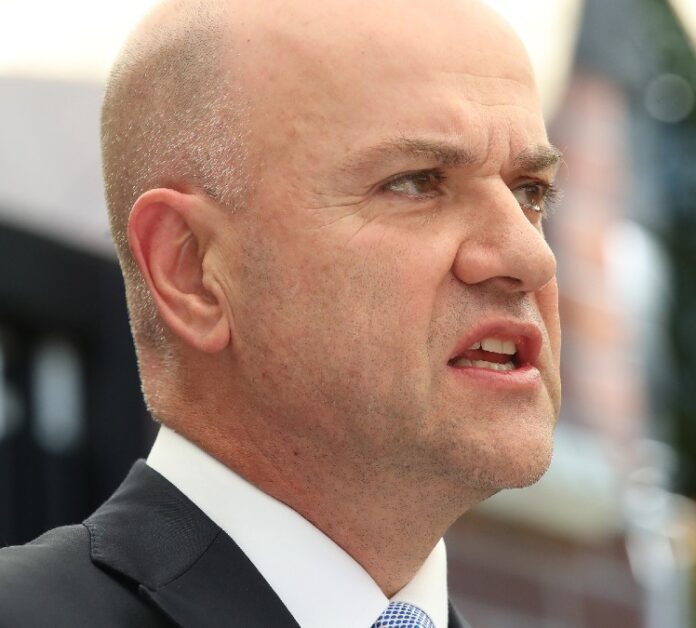Queensland recorded 2222 cases of the coronavirus on Thursday as the chief health officer foreshadowed that numbers would rise to “tens of thousands” in coming weeks.
But Dr John Gerrard said so far since the borders opened there were no people in intensive care nor any deaths for around 8,500 current active cases.
That compared to 204 patients in ICU and 30 deaths across Australia when there was a similar number of infections in 2020.
Dr Gerrard said he had been speaking closely with doctors who said there were likely to be some ICU admissions in coming days.
The problem when cases hit the tens of thousands would the larger number of people being hospitalised, he said.
But Dr Gerrard said the state needed to keep moving forward and not enter lockdowns, instead using measures to mitigate the spread such as masks.
The latest case numbers come as national changes were announced to testing and close contacts.
The prime minister said isolation periods for COVID-positive cases and close contacts would be slashed and Australia would more heavily rely on rapid antigen tests.
Positive cases regardless of vaccination status will be able to leave isolation seven days after their positive test, but will need to return a negative rapid antigen test on day six.
A close contact will only cover household or intimate contacts who spent more than four hours with a positive case, states and territories agreed at an emergency national cabinet meeting on Thursday.
Close contacts will only need a rapid antigen test and will be able to leave isolation after seven days if they return a negative rapid antigen test on day six.
South Australia will continue with a 10-day quarantine period for cases and close contacts.
Symptomatic close contacts will still need to take a PCR test and positive rapid tests will need to be confirmed by a PCR test.
Chief medical officer Paul Kelly said the four-hour threshold was a way of dealing with the increased caseload.
It comes as testing clinics across the eastern states struggle with extreme demand and massive queues, and result turnaround times blowout.
“We will have more cases. There is no doubt about that,” Professor Kelly said.
“It is about using the resources we have wisely.”
Queensland and Tasmania will accept a negative rapid antigen test from travellers from January 1.
Prime Minister Scott Morrison said keeping the same response for the Delta variant for the Omicron variant “makes no sense”.
“If you are anything other than a close contact, and you are not symptomatic, you don’t need to go and get a test,” he told reporters in Canberra.
“I know it is a change from what has been said, but dealing with Delta is very different to dealing with Omicron.”
Asked whether the shorter isolation requirements would result in more deaths, Mr Morrison said he was confident the new rules were the best way to manage the more transmissible variant.
Five jurisdictions — NSW, Victoria, Queensland, South Australia and the ACT — will move to adopt the new definition from Friday.
Tasmania will join from January 1 and the Northern Territory and Western Australia will make announcements in the coming days.
State testing centres will also hand out rapid antigen tests over the coming weeks, but tests will not be provided for free across the board, the prime minister says.
“Rapid antigen tests will be provided publicly at those testing centres for those who require one according to the rules,” Mr Morrison said.
“For all other casual uses, that is what the private market is for.”
States will also look at exceptions to the more narrow definition in high-risk settings and vulnerable communities.
“We might flex up the definition of close contacts in a residential aged care facility because we know people there are far more vulnerable, or if we know there have been a large number of new cases or community transmission within an individual workplace,” SA Premier Steven Marshall said.
International arrivals in NSW will only need to take a rapid antigen test instead of a PCR test, a move which will help alleviate pressure on testing clinics with 5000 flying into Sydney every day, Premier Dominic Perrottet said.
“It is a more balanced approach and an approach that suits the circumstances at the time,” he told 2GB.
States have also continued to report record case numbers.
Some 12,226 new cases were reported in NSW on Thursday, up from 11,201 on Wednesday, while in Victoria case numbers jumped to 5137 from 3767 the day before.
Victoria reported 13 deaths while NSW reported one.
SA also reported the death of a COVID-19 positive child under the age of two as the state recorded 1374 new infections. The child’s death is being investigated by the coroner.
There were also 2222 cases in Queensland, 92 cases in Tasmania, 253 in the ACT, 37 in the Northern Territory and one in Western Australia.
-with AAP





